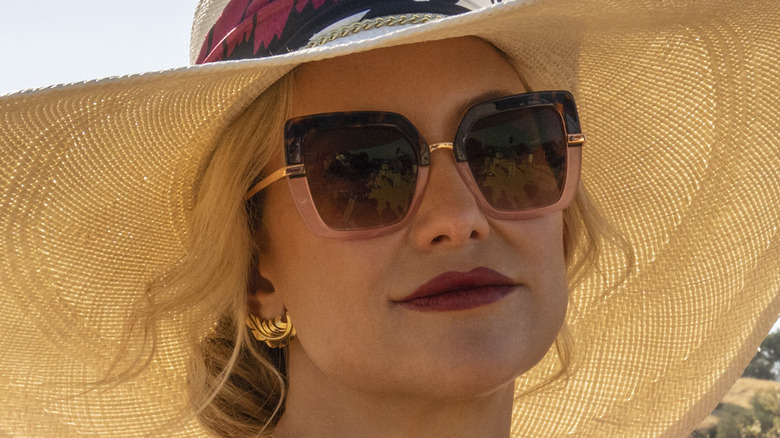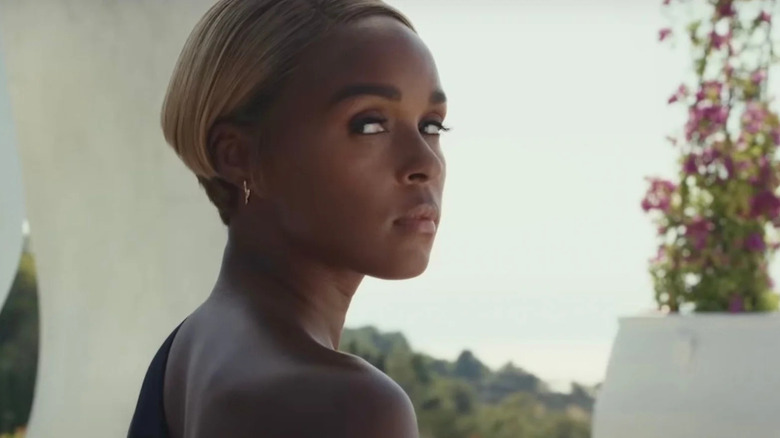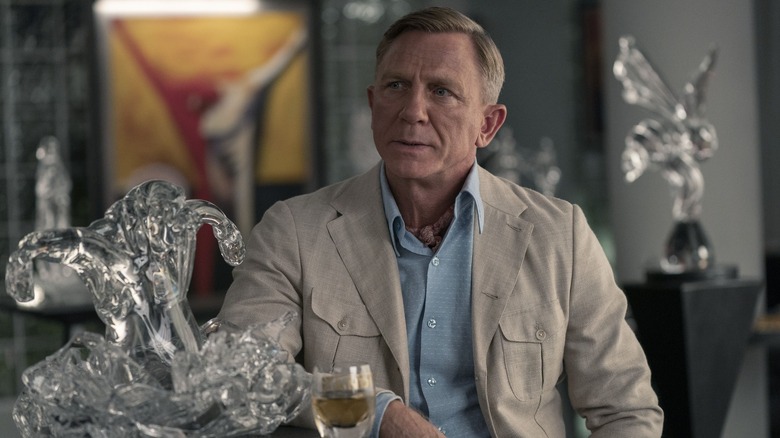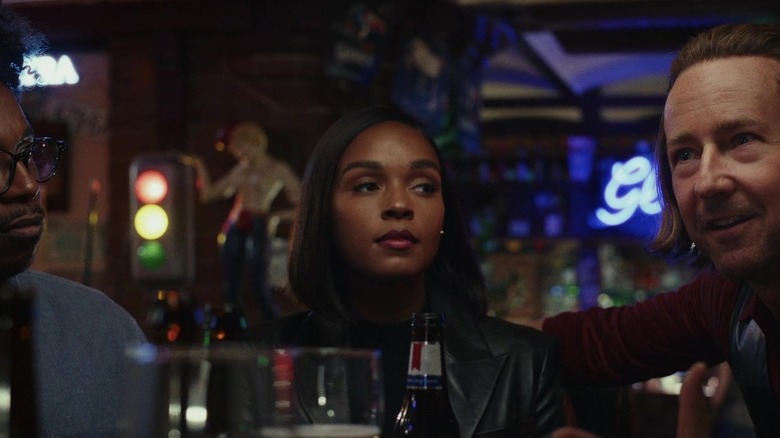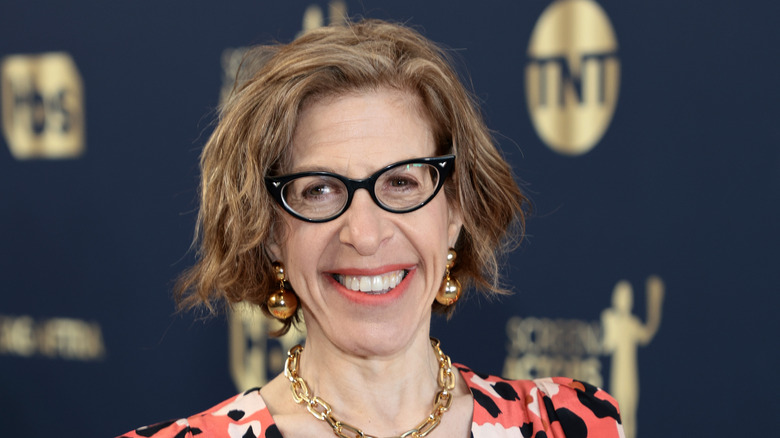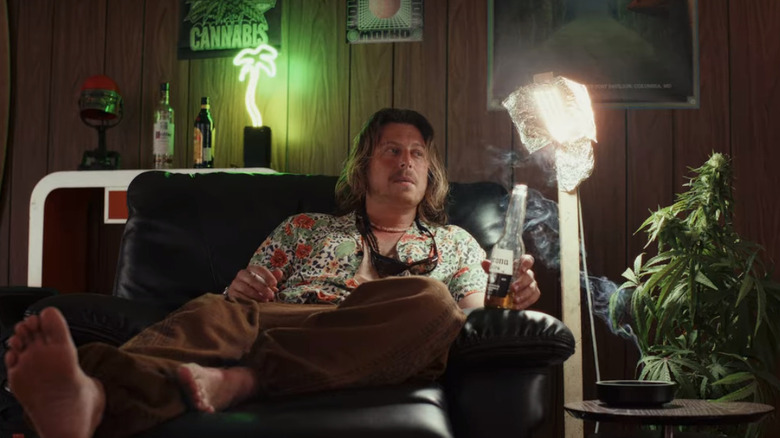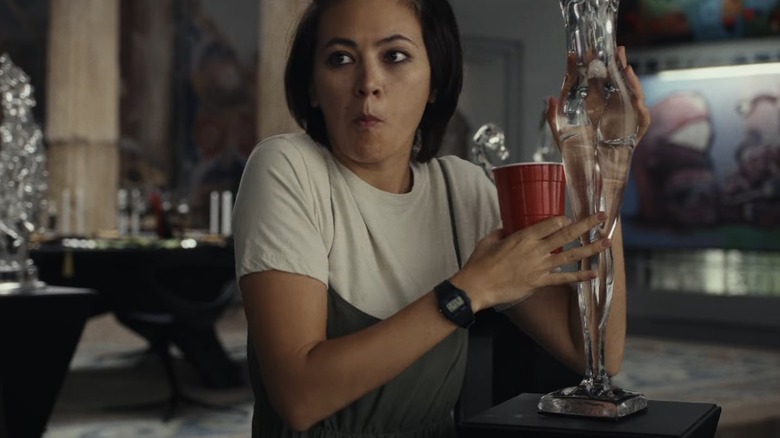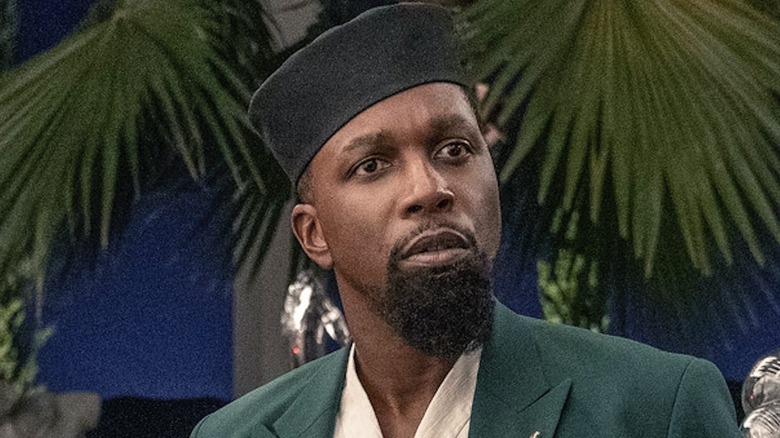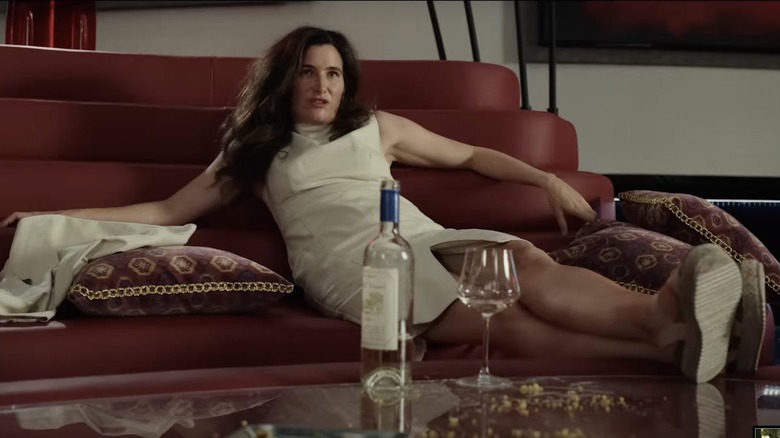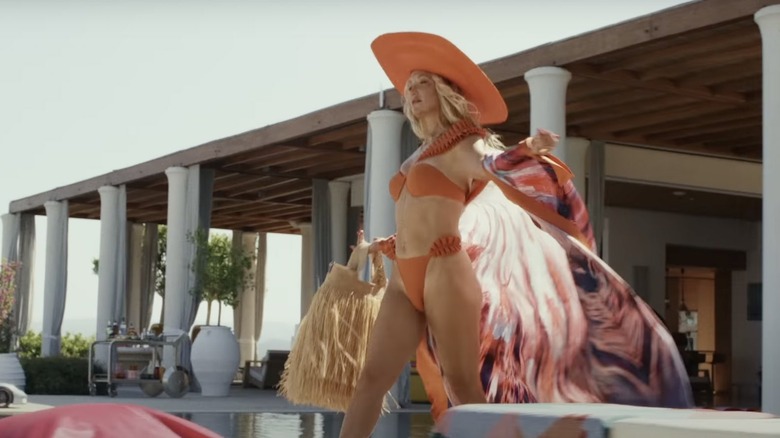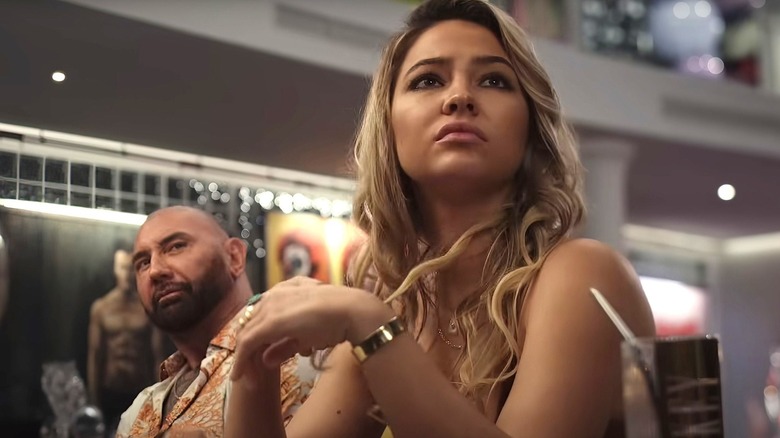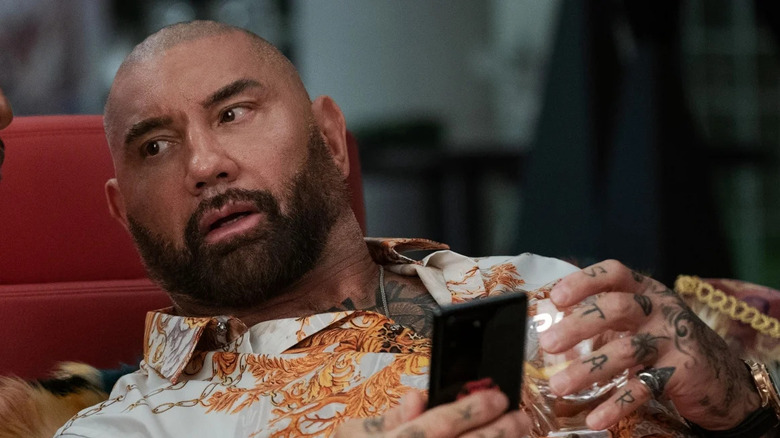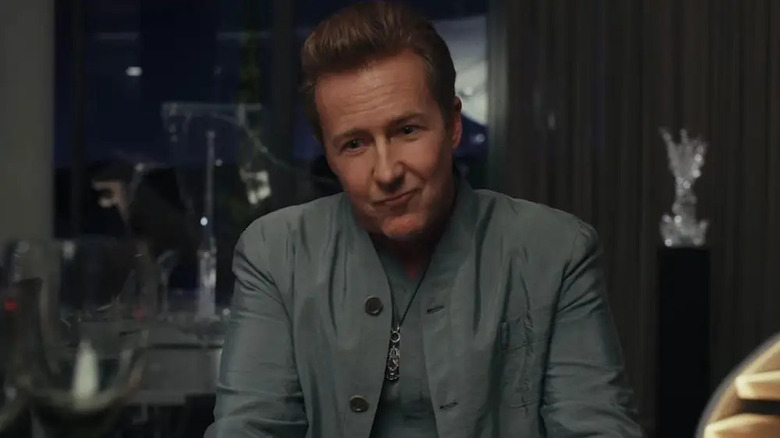Glass Onion: A Knives Out Mystery Characters Ranked By Awfulness
Contains spoilers for "Glass Onion: A Knives Out Mystery."
Rian Johnson has done it again, and by "it," we don't just mean that he delivered yet another massively entertaining subversion of a whodunit. Like "Knives Out," "Glass Onion: A Knives Out Mystery" features an ensemble cast of characters, a few of whom we love, but most of whom we love to hate. These modern archetypal characters and the social commentary they provide merely by existing are just as important as the plot. They're brought to life by an eclectic and accomplished group of actors who seem to relish playing jerks, divas, and blowhards as much as the audience enjoys eating up their performances.
The first film, which starred Ana de Armas, Chris Evans, Jamie Lee Curtis, and many others, centered around a publishing magnate and his old-monied New England family. The sequel (or really, the second in a planned series of Benoit Blanc mysteries) gives almost a dozen more stars the chance to play sycophantic, new money "disruptors" whose real-world counterparts aren't that much of a mystery. Their ostensible leader, Miles Bron, has invited them for a weekend at his private Greek island, where they'll participate in a murder mystery dinner in which he's the victim. Of course, the game is thwarted and a real murder takes place, leaving every morally compromised character a potential suspect. From white lies to dark money and much, much worse, this is how the characters in "Glass Onion" rank in order of sheer awfulness.
12. Helen
"Glass Onion" establishes something of a pattern. If Benoit Blanc is on a case, he needs a relatable, good-hearted, working-class female sidekick to help him get to the bottom of the mystery. In "Knives Out," that sidekick was Marta, the live-in employee of novelist Harlan Thrombey, who's set up to take the fall for his murder. This time, it's Helen, an elementary school teacher and the identical twin sister of murdered tech mogul Cassandra Brand (both played by an excellent Janelle Monáe). Blanc and Helen make a great team, largely because she has so much agency and phenomenal crime-solving skills ... and that's all before she seeks out the detective's services.
When Andi is suspected of having killed herself, Helen rummages through her place and puts half the case together on her own. Andi had recently found the soon-to-be infamous napkin, and emailed her backstabbing friends to let them know. 24 hours later, the napkin was gone and she was dead. Helen knows Miles or the others must've been involved — she just needs Blanc's help to prove it. But on their impromptu Greek vacation, she proves herself to be a worthy detective in her own right. Helen's sense of right and wrong is impeccable (even if she does end up destroying the world's most precious work of art). She gets justice for her sister, exposes the disruptors' complicity, and saves humanity from any more of Miles' catastrophic innovations. Not bad for someone who'd been doing a lot of Zoom tie-dye with grade schoolers just a week or so earlier.
11. Benoit Blanc
The introduction of famous gentleman detective, Benoit Blanc, as Rian Johnson's version of Hercule Poirot was a resounding success. But the return of Blanc in "Glass Onion" is a triumph and a revelation. We get to know Blanc much better in the second film, since "Glass Onion" briefly expands its cinematic universe to show him in his home environment. As a result, Daniel Craig — who was charming if stoic in his first go-round — has more notes to play, particularly comedic ones. Yes, Benoit Blanc is still observant, kindly, cultured, and restrained. But he also has little patience for stupidity, and his race car-like mind makes him susceptible to irritability and melancholy when he doesn't have a dangerous case to solve. For example, as the film opens amidst a backdrop of the early days of the pandemic, he's spending far too much time sulking in the bathtub for his partner Phillip's liking. Benoit Blanc 2.0 has more personality, and "Knives Out" fans are here for it.
Detectives in mysteries are often among the least interesting characters, but Benoit Blanc just might be the most likable detective in any such franchise to date. Sure, he's ever so slightly snobbish, and he does allow Helen to put herself in harm's way, but we should consider ourselves lucky that Johnson and Craig have combined their powers to create such a delightful and compelling protagonist. He sees through the disruptors' gibberish and posturing immediately, and though he's hemmed in by the constraints of the law, he makes sure Helen gets her man in the end.
10. Andi Brand
When Helen shows up at Benoit Blanc's door, what she really wants to do is make her case. She's resolute that her sister, Andi, didn't die by suicide. Using stories from their childhood and Andi's meticulously kept diaries, Helen paints Blanc (and the audience) a picture of who Andi really was — which is helpful, since we only see the real Andi for a few split seconds in "Glass Onion," in flashbacks at the bar, the trial, and finally at her home on the day she died.
While Helen and Andi both made fun of the rich, Andi had the aspirations and the talent to actually join them. She was brilliant in a way that people like Miles could only pretend to be. She was also the type of person who actually built things, from a circle of friends to tech start-ups. Andi built networks between the group of disruptors, turning their ideas into functioning enterprises. And she headed up Alpha for nine years, succeeding in spite of Miles's involvement with Miles. Andi was admirably ambitious, the kind of leader who helped others up the ladder. And most importantly, she knew where to draw the line. She wouldn't let Miles proceed with Klear when she realized how dangerous it was, and it cost her her life. Andi's fatal flaw was that, for someone with so much instinct and insight, she wasn't a very good judge of character.
9. Duke's Ma
The best puzzle solver in "Glass Onion" isn't Lionel, Claire, or even Benoit Blanc. It's Duke Cody's Ma, played by Jackie Hoffman in an uproarious yet understated cameo. Ma Cody is busy doing mom stuff while her 40-something son records right-wing videos in her garage. Much to his chagrin, she interrupts his live stream to let him know that Miles sent over a package. With her attention split and out of the corner of her eye, she's able to identify that the custom wooden box is a stereograph that contains a Fibonacci sequence within.
Ma Cody is noticeably cleverer than her son, who gets frustrated being upstaged by his mother in front of his disruptor friends. He still speaks to her as if he's an angsty teen and she won't leave him alone (until he needs his speargun, that is). When she's had enough of his back-talking, she gives him a good scuff. It's great that Duke had a strong, smart, no-nonsense female role model in his life like his mother. It just doesn't seem to have done him much good. Or maybe his whole persona is a reaction to her. We can't blame Ma for presumably letting him move back in when his Twitch empire collapsed. Most parents wouldn't turn away their own kids in their time of need. And even though Duke is a real piece of work, mothers aren't entirely responsible for who their children turn out to be.
8. Derol
Derol serves two purposes in "Glass Onion": He's a red herring and one of the movie's best sources of comic relief. Played by Noah Segan, Derol is a man of leisure grooving on Miles's dime. Viewers might wonder whether the unkempt house guest could play a key role in the murder mystery, but savvy sleuths probably guess that he is mostly a fun Easter egg-style cameo and a hilarious distraction. When we first meet him, Miles tells everyone not to worry about him. He's just staying at the compound, working through some personal problems, and the timing of his visit just happens to coincide with the themed party. He's "not part of the experience at all." In a meta way, this is Johnson tricking us by telling us the truth about a character we might be tempted to misinterpret otherwise.
You might be surprised to find someone as unmotivated and unremarkable as Derol so low on this list. But we don't really know anything about the origin or nature of Miles and Derol's friendship, so Derol isn't necessarily guilty by association with Miles the way that Claire and Lionel are. When Helen bursts in on him, he just wants to hang out. And in the end, this harmless stoner seems content to watch the police boats coming for his benefactor.
7. Peg
Most of us normies would be simply enchanted by the idea of jetting off to a picturesque island for an all-expenses-paid vacation, but Peg — Birdie Jay's longtime assistant — has been around this stratum of celebrity enough for the shine to have tarnished. She's loyal to her boss not because she's personally devoted to her, but because her work history is entirely Birdie Jay-related. If Birdie flies high, so does Peg. If Birdie crashes and burns, so does she. One could argue that Peg is the small-stakes version of the rest of the cast, leeching onto Birdie's fame for her own gainful employment. But Peg is relatively down to earth and toils (sometimes in vain) to keep Birdie from embarrassing herself. It is a job, even if it comes with perks like travel and free drinks.
"Glass Onion," with its large ensemble cast of outsized characters, doesn't leave much time for unassuming Peg. The most fun thing about her in the film is her quiet admiration of Andi (who she believes to be Helen) as she delivers a scathing monologue about her former friends' despicable allegiance to Miles. This implies that Peg would like to see the disruptors get what's coming to them (maybe including Birdie Jay), though she's not in a position to dole out the just desserts herself.
6. Lionel Toussaint
Of all the disruptors, Lionel is the least terrible. However, that doesn't mean he comes out of "Glass Onion" unscathed. Miles tells us that Lionel didn't languish in academia waiting 10 years to publish. Likely, this means he started working for Alpha shortly after the company took off. Plenty of research scientists work for private companies rather than governmental or educational institutions, so that, in and of itself, isn't a strike against his character. And even in his capacity as Miles's right-hand man (and the actual innovator behind his discoveries), he puts up more of a challenge to the deluded billionaire CEO than the vast majority of the other yes men and women in his inner circle. Lionel repeatedly insists he needs two years to get Klear to market, and in most circumstances (like when Duke suffocates) he does the right thing over Miles's protests.
But Lionel still enables Miles and defends him among the company's detractors. On a zoom call with other research scientists and division heads, he reminds everyone that Miles's crazy ideas sometimes pan out and fund their work. In a way, Lionel's reputation lends legitimacy to Miles's tech empire, undeserved legitimacy since it's still the arrogant, unqualified Miles pulling the strings. And when push comes to shove, Lionel lets Miles have his way. He lied to Andi's face in court, just like the rest of them, and when it comes to keeping his boss in check, he's more talk than walk.
5. Claire Debella
With his "Knives Out" movies, Rian Johnson gleefully skewers the disgustingly wealthy in addition to solving charmingly convoluted murder plots. But, at least among the privileged class, he's an equal opportunity roaster. "Knives Out" contained characters from across the political spectrum, as does "Glass Onion." Claire Debella is a boring former soccer mom who Andi encouraged to run for office. She rose through the ranks and became governor of Connecticut by championing a hard-line climate change platform. With her TED talk tote, we're meant to think of her as an inoffensive, upper-middle-class champion of liberal causes.
Johnson likes to expose his characters' hypocrisy, and that's exactly what he does with Claire. When the group shows up at the dock, she's wearing a mask, but under her nose. She's fully aware of how much her progressive persona is for show. When Duke dies and Benoit asks for Miles to call the cops, her first thought is how much her reputation will take a hit. It won't exactly look great that she was breaking lockdown guidelines to party in Greece with a men's rights activist who ended up dead. But the most regrettable thing about Claire is how quickly she trades her altruism for Miles's financial support. She does seem to have honest-to-goodness beliefs, so it's understandable that she'd be taken in by Klear's potential at first, but a younger and more virtuous Claire would be ashamed of the extent to which she's colluded with Alpha for political gain.
4. Birdie Jay
Birdie Jay just isn't a good person. The vapid model-turned-sweatpants designer proves it throughout "Glass Onion." She's prone to casual racism. Her extremely loose interpretation of the concept of a COVID pod and her fishnet face mask are symbolic of how little she's willing to sacrifice for the common good. Her vanity steers almost every decision she makes. She laments to Peg that Miles used to be a nobody when she was a somebody, and she misses the power she could wield over him. She's intimidated by the younger, fitter Whiskey's swimsuit body. In short, Birdie's a hedonistic, contrary, superficial C-list celebrity who's holding on to relevance for dear life.
But ... there is a floor to her awfulness that doesn't exist for some of the other characters in "Glass Onion." She's a handful for her assistant, Peg, who can't even let her have a phone for fear of what she'll tweet, but Birdie doesn't appear to treat Peg as cruelly and inhumanely as the employer in this type of half-personal, half-professional relationship could. And interestingly, she wound up in the center of a scandal not because she's so greedy that she approved sweatshop labor, but because she's so airheaded that she didn't understand an email. Her defining traits are her childlike self-absorption and lack of responsibility or accountability, not any proclivity toward knowing malice.
3. Whiskey
When we first meet Whiskey, she's walking into Duke's shot to talk about how much she loves her boobs (sorry, feminists) in support of his nonsensical argument about the "breastification" of America. She's coded as the type of dumb blonde who derives her self-worth from her youth and good looks and who's gone all-in on being a culture war foot soldier for conservative-leaning men. We might even worry that she's being used by men like Duke and Miles, but we come to discover that she's entirely complicit in her own exploitation ... which is its own kind of awful.
Whiskey and Miles are instantly flirtatious, which tricks the audience into thinking she's a gold digger who's trying to use the Greek island getaway to level up from a semi-famous meathead to a serious mover and shaker. Then, we realize she's playing both sides. She's sleeping with Miles of her own volition and accepting expensive gifts from him, but she's also sleeping with him on Duke's behalf, as a bargaining chip for a coveted TV spot, since doing so would raise her own profile. Whiskey's motivation is always the promotion of her own "brand." For example, she worries that Duke has become too fringe, which isn't good for business. She is genuinely upset when her boyfriend dies. But she's ultimately a soulless character who undersells her own intelligence in her meaningless quest for followers.
2. Duke Cody
Of all the modern archetypal characters in "Glass Onion," Dave Bautista's Duke Cody is the easiest to identify. He's a vlogger and influencer in the men's rights online space who started out as a video game nerd and bodybuilder. With Andi's friendship and guidance, he funneled his passions into a career, albeit one he (like Birdie) is apt to self-sabotage. When we meet Duke, he's lost his sponsors after hocking unsafe sexual supplements to teenage boys (he insists they were rhino-free). He and Whiskey are making YouTube videos in his mom's garage and desperately scheming to get on Alpha News.
Though Duke is obviously inspired by figures like Joe Rogan, we don't actually get to hear much of his "disruptive" personal philosophy. He's flippant about the pandemic and eager to stand up (and talk down) to who he thinks is Andi, but he doesn't bloviate about the plight of the traditional man as much as we might expect. "Glass Onion" is already longer than its predecessor at two hours and 19 minutes with an airtight script, but still, it would've been wickedly fun to hear more of Duke's misogynist so-called wisdom. As it is, we're left with his self-presentation (guns are, predictably, a big part of his identity) and behavior (he's comfortable pimping out his girlfriend so long as it gets him on TV). There's a hint of teddy bear niceness to Duke Cody in the way he interacts with Claire, Lionel, and Birdie, but the nice guy he could've been was swallowed up by the macho clown long ago.
1. Miles Bron
There's no mystery about it; Miles Bron is easily and objectively the most awful person in "Glass Onion." That Benoit Blanc correctly identifies him as Andi and Duke's murderer doesn't help his cause, but even if he hadn't killed two of his friends (and attempted to kill Helen), he'd still be the absolute worst. When we see Miles in flashback meeting Andi's crew for the first time, he's styled exactly like Tom Cruise's character in "Magnolia," a deeply problematic motivational speaker who's all bravado and no brains. It's a subtle but major clue as to Miles's disposition. So is the way he treats Paul McCartney's guitar and the Mona Lisa, not to mention Whiskey, Birdie, Lionel, and Claire. His bad taste in art and his misuse of big words are obnoxious and proof that he's decidedly not a genius, but it's his ego and complete lack of a moral compass (especially as he masquerades as Earth's would-be savior) that make him a true villain.
Whether Miles is based on one particular tech billionaire or a composite of too-powerful CEOs, he displays some toxic qualities that have become synonymous with their type. To Miles, all relationships are transactional. That's how he manipulates everyone to his side. In exchange for their lies, he offers money, opportunity, and clout while Andi holds fast to the purity of her friendships and convictions. He's also convinced of his own brilliance, which causes him to reject any feedback (like Andi's warnings about Klear) that contradicts his being right. Fragile, selfish, and shallow, Miles is always just looking for affirmation and attention, even if it means watching the world burn.
